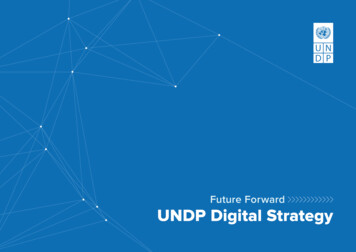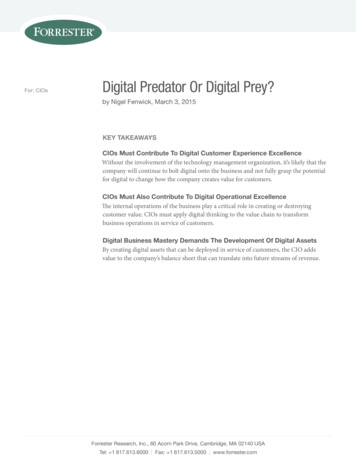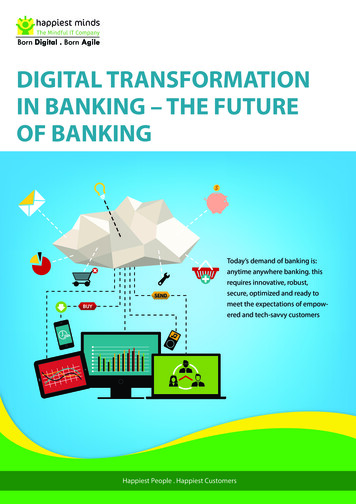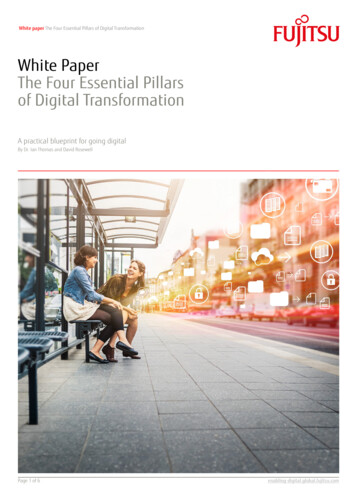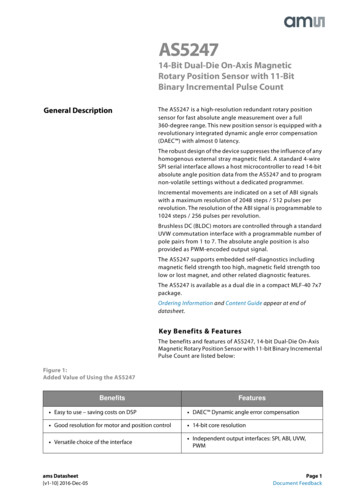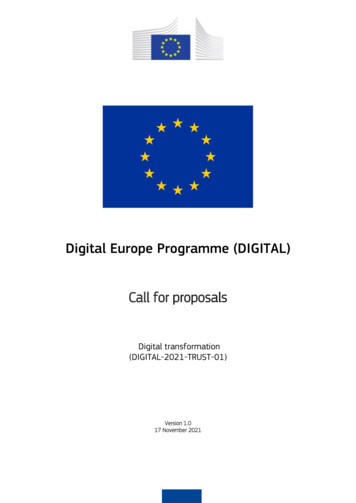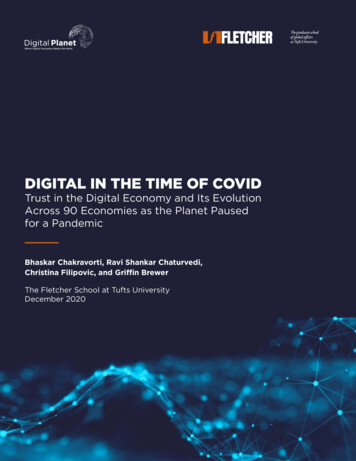
Transcription
Digital Intelligence IndexDigital Intelligence IndexDIGITAL IN THE TIME OF COVIDTrust in the Digital Economy and Its EvolutionAcross 90 Economies as the Planet Pausedfor a PandemicBhaskar Chakravorti, Ravi Shankar Chaturvedi,Christina Filipovic, and Griffin BrewerThe Fletcher School at Tufts UniversityDecember 2020I
Digital Intelligence IndexWelcomeThis research was made possible by generoussupport from and in collaboration with:Data PartnersData SourcesAkamaiGlobal Partners DigitalApp AnnieGlobalWebIndexBlue TriangleGSMA IntelligenceCarnegie EndowmentHootsuitefor International Peace,AlgorithmWatchCIGI-IPSOSCNILComparitechDLA PiperECIPEEdelmane-Governance AcademyEuromonitorEurostatFreedom HouseGallupInternational TelecommunicationPrivate Capital ResearchInstituteReuters InstituteStatistaTransparency InternationalUnion (ITU)United l Postal UnionMediumWe Are SocialMicrosoftWorld BankNumbeoWorld Bank FindexOECDWorld Development IndicatorsOneZero MediumWorld Economic ForumOoklaWorld Values SurveyOpen Knowledge FoundationWorldpay Global Payments ReportOxford Readiness Index1
Digital Intelligence IndexWelcomeAcknowledgmentsThe authors are grateful for the support and guidance of our colleagues and collaborators. Without the advice andcritiques of many distinguished experts, this work would not have been possible. The views expressed in this report,the underlying analysis, the visualizations on our interactive site, and any errors within are the authors’ alone.Our near-decade long research partnership with Mastercard has been collaborative in the truest sense of the word. Weare immensely grateful to Ajay Bhalla and Paul Trueman for all the insights and unwavering support over the years andfor cheering us on as we continue to chart the hitherto unexplored corners of the Digital Planet. We are also grateful toJosephine Wolff, our faculty advisor, for the sage counsel and guidance in shaping this edition of our research.We are extremely proud and appreciative of the members of our phenomenal research team—the incredibly talentedstudents and recent graduates of The Fletcher School and other schools at Tufts University—who brought theirintellectual curiosity and analytical smarts to enrich this research. The year 2020 defies description; it would bean understatement to say this has not been an easy year to conduct research. We doff our hats to all our studentanalysts—for their immense dedication and their spectacular work ethic amidst all the pandemonium of the pandemic.Aditya Ramachandran, Alyssa Pak, Andrew Vu, Avni Ambalam, Carlo F. Salazar, Christabell Makokha, ChristopherDuyos, Devyani Singh, Eda Yilar, Edbert Jao, Eleanor Jenke, Elizabeth Sims, Emmanuel Gebremeskel, Guo Chen, HeidyAcevedo, Henry Fernandez, James Carroll, Joseph Dunbar, Karissa Monteiro, Katy Mayerson, Malavika Krishnan,Mariam Amini, Ming Dongfang, Mohammad Uzair Akram, Oliver Martinez Lopez, Patrick Beliard, Pranav Jain, RayMarolt, Rebecca Kurland, Reegan Coleman, Samantha Hubner, Siddhant Dayal, Stella Henderson, and Victoria Kulesza,our sincerest thanks to you for all your contributions.A very special thanks to our colleague Joy Zhang, who supported this work with great diligence. We appreciate thelong hours and hard work you put into leading the QA and the red team on this project. Our thanks to you and the teamfor going through mindboggling amounts of data with a fine-tooth comb and for spotting and squashing bugs on ourinteractive research platform in record time.As we unveil our most ambitious endeavor to date—an interactive platform of scorecards measuring various aspectsof the global digital economy—we reminisce with great fondness and gratitude the contributions of Sarah Ryan, RuiruoWu, Caroline Troein, Cassandra Pagan, and generations of student analysts from across Tufts since 2013 towardbuilding the robust foundations and many layers of this research edifice on which this platform, the Digital IntelligenceIndex (DII), rests.Digital Intelligence Index is the beneficiary of data contributions from our partners—Akamai Technologies Inc., BlueTriangle Technologies, Mastercard, the Private Capital Research Institute (PCRI), and GlobalWebIndex. Our grateful2
Digital Intelligence IndexWelcomethanks to Claire Le Gal and Din Uppal from Mastercard; Dan Revellese, Emily Creager, Mike Dockins, David Snyder,and Mason Martin from Blue Triangle Technologies; Ari Weil, Anders Hokinson, Chris Stern, and Paul Thompsonfrom Akamai Technologies; Virna Sekuj, Doug Gorman, and Christy Civitanova from GlobalWebIndex; and LeslieJeng from PCRI for your unconditional help. Over the years, we have been fortunate to cultivate around our researchprogram a growing group of well-wishers and data partners whose input, advice, and insights have been invaluableto us. We are grateful to all of you for your continued partnership with us.A special shout-out to our technology wizards at Tufts, without whom our interactive platform would not have seenthe light of day. João Quintino, Thomas Cox, Steven Garrett, Bill Sivret, Sauyee Wong, and Michael Maciolek, weare deeply grateful to you for your timely help and guidance. We will continue to draw on your kindness as we buildmore interactivity into this platform.This report benefited greatly from the keen eye of Julia Magnusson, our editor. We are grateful to thecommunication and PR teams—for all their efforts in helping us share this work with the world. Dania Saidam andKerry Cooper-Bradfield from Mastercard; Joseph Nallen, Lindsay Hammes, and Alexandra Bowser from Fletcher;Jen Heady, Kenneth Craig, and Christine Williamson from Greenough; and Lauren Welford, Tom Derrick, FrancescaCrias, and Julia Taylor from Ketchum, our sincere thanks to all of you.A picture is worth a thousand words. Our grateful thanks to our inimitable and immensely talented design teamat Sunny Side Up — Anand Krishnan, Aniket Mahajan, Durga Deepak, Hari Krishnan, Mohammad Jahangir, NeerajSharma, Poonam Rao, and Riya Chak — for the nifty visualizations of our Digital Planet research and for helping turnthe idea of an interactive DII platform into reality.We would be remiss if we did not thank our colleagues behind the scenes whose support and everyday acts ofkindness have created a vibrant space for us and our team to think about and conduct research on the global digitaleconomy. Agnes Hatley, Akiyo Fujii, Ann Cullen, Brad Macomber, Cyndi Rubino, Dorothy Orszulak, Ellen McDonald,Emily Rezendes, Gerard Sheehan, Gregory Simpson, Halley Goldman, James Rollins, Kristen Zecchi, Lupita Ervin,Maria Pereira, Dean Maribel Blanco, Dean Rachel Kyte, Susan Lagasse, Shelley Adams, and Therese Vienot, we aregrateful to you.3
Digital Intelligence IndexAuthorsDr. BHASKAR CHAKRAVORTI, Principal InvestigatorThe Dean of Global Business at The Fletcher School at Tufts University, Bhaskar Chakravorti isalso the founding Executive Director of Fletcher’s Institute for Business in the Global Context(IBGC), and Chair of Digital Planet. He has experience in academia, strategy consulting,and high-tech R&D, formerly on the faculties of Harvard and University of Illinois, partner atMcKinsey and Monitor and as a game theorist at Bellcore (formerly Bell Labs). Chakravorti’sbook The Slow Pace of Fast Change was rated one of the best business books of the year. He hasbeen published widely in peer-reviewed academic journals and in The New York Times, The WallStreet Journal, Financial Times, Harvard Business Review, Foreign Affairs, Foreign Policy, Forbes, TheIndian Express, among others.RAVI SHANKAR CHATURVEDI, Co-InvestigatorRavi Shankar Chaturvedi is the Director of Research, Doctoral Research Fellow for Innovationand Change, and Lecturer in International Business at Fletcher’s Institute for Business in theGlobal Context (IBGC), where he leads the Digital Planet research program and teachesinternational strategy and innovation. Chaturvedi has extensive experience in emerging markets,strategy and business management, and the payments industry and has served as a memberof the Advisory Group for the Estonian Government’s e-Residency. He has written severalinfluential articles in Harvard Business Review and Foreign Affairs.CHRISTINA FILIPOVIC, Research Team LeadChristina Filipovic is a Senior Analyst at the Digital Planet research program at Fletcher’sInstitute for Business in the Global Context (IBGC). In addition to her work on DigitalIntelligence, she led the Ease of Doing Digital Business research initiative. Prior to Fletcher andDigital Planet, she worked in government affairs and advocacy.GRIFFIN BREWER, Research AnalystGriffin Brewer is a Research Analyst at the Digital Planet research program at Fletcher’s Institutefor Business in the Global Context (IBGC). In addition to his work on Digital Intelligence, hecontributed to the social distance digital readiness research.Authors4
Digital Intelligence IndexDigital IntelligenceContentsIndexContentsExecutive Summary. 6Context.14The Digital Intelligence Index Platform: An Overview.16The Drivers of Digital Evolution.19 Charting Digital Evolution.21 The Four Zones of Digital Evolution. 22 Scores and Rankings. 22The Drivers of Digital Trust. 25 Digital Environment.26 Digital User Experience.26 Attitudes.26 Behavior. 27 Scores and Rankings.28Integrating Digital Evolution and Trust. 36Main Takeaways and Implications. 39 Digital evolution is a contributor to economic resilience. 39 More data privacy protections, less data protectionism.44 Mobile internet access is necessary but not sufficient.45 Empower consumers with “digital hygiene” and literacy skills.46 Strike a balance between fast growth and a sustainable trust environment.47 Digital entrepôts are linchpins of the global digital economy.48Cross-Cutting Patterns and Insights.49Regional Patterns and Insights.50Methodology.60Glossary.65Endnotes.705
Digital Intelligence IndexExecutive SummaryExecutive SummarySuffice it to say, the year 2020—the year of the COVID-19 pandemic—defies description. Indeed, the publisher ofOxford Languages “Word of the Year” declined to select a single word, as “it became quickly apparent that 2020 isnot a year that could neatly be accommodated” in just one word.1 The data do not quite do justice to 2020 either. Atthe time of writing, there have been over 61 million COVID-19 cases and over 1.4 million deaths worldwide.2 The factthat the world economy is expected to contract by 4.4 percent,3 that most countries around the globe are on the brinkof recession,4 or that global consumer confidence is 5 points lower than its historic average5 does not seem to fullycapture the disruption and distress wrought by the pandemic this year. Beneath these statistics are individual lives lost,families displaced, and livelihoods reinvented. As we cautiously look around the corner toward 2021 and beyond, thepath to recovery will be “long, uneven and uncertain.”6Amidst all of the turmoil of 2020 triggered by the SARS-CoV-2 coronavirus, one trend did emerge clearly: digitalizationhelped people work, learn, shop, and socialize safely during a pandemic and hold on to some semblance of normalcy.In April, an estimated 1.2 billion children were affected by school closures,7 with learning mostly moving online—forthose who had access. The global e-commerce market is expected to grow by nearly one-third from 2019 to 2020.8Social events such as weddings, birthdays, and holidays quickly shifted online; the widely used video conferencingapplication, Zoom, at this writing, has a market capitalization of 129 billion, making it worth more than IBM.9Ninety-three percent of respondents in a global survey of executives reported an increase in remote working and/orcollaboration, with over half of those saying they believe that the shift to remote work will stick.10 At the same time,the pandemic exacerbated existing inequalities,11,12 leading many participants in the global economy to question howbusiness and policymakers might work together to “build back better.”13 Even as several promising vaccines are onthe horizon, and as we collectively navigate a path out of the pandemic and the worldwide “pause” that it gave riseto, we hope this work provides decision-makers with the tools to recognize the role of digital technologies during thispause. We also hope that this study of the evolution and state of trust in digitalization can help us harness these verytechnologies to ensure a more inclusive and resilient future.It is in this context that The Fletcher School at Tufts University, in partnership with Mastercard, present the DigitalIntelligence Index. The current index encompasses the third edition of the Digital Evolution scorecard, following up onour earlier editions in 201714 and 2014,15 and the second edition of our Digital Trust scorecard.The Digital Intelligence Index is a data-driven holistic evaluation of the progress of the digital economy across 90economies, combining more than 358 indicators in two scorecards: Digital Evolution and Digital Trust. Digital Evolutioncontains four key drivers: Supply Conditions, Demand Conditions, Institutional Environment, and Innovation andChange. The resulting framework captures both the state and rate of digital evolution and identifies implications forinvestment, innovation, and policy priorities.The Digital Trust scorecard covers a smaller group of 42 economies and contains four key drivers: Environment,Experience, Behavior, and Attitudes. These measures consider the trustworthiness of the digital ecosystem in eacheconomy, the level and types of friction in digital experiences, the depth of engagement among internet users, and the6
Digital Intelligence IndexExecutive Summarylevel of trust in the digital ecosystem expressed by citizens. Given the rise in misinformation16 fueled by the pandemic,politics and other societal factors; the accelerating reliance on online technologies and on large technology companies;the waning faith in institutions;17 and the alarming increase in cyberattacks,18 the subject of digital trust—how tofoster it, how to harness it, and how to think about its presence in a future where decisions are guided by artificialintelligence—is of prime importance.The Digital Evolution framework segments 90 economies into four zones: Stand Outs, Stall Outs, Break Outs, andWatch Outs. Within the Stand Out segment, three economies are particularly notable for maintaining a high absolutescore and fast digital momentum. These “super-Stand Outs” include the South Korea, Singapore, and Hong Kong.19These economies, along with other small nations, islands, and entrepôts such as New Zealand, Estonia, Taiwan, and theUnited Arab Emirates, are consistently top performers in our Index and have demonstrated nimbleness, adaptabilityto change, and institution-led support for innovation. Remarkably, for an economy of its size and complexity, the USscores second after Singapore in digital evolution.China20 is a noteworthy outlier for a very different reason. It is moving faster in digital evolution than all othereconomies, especially because of its growth in both demand and innovation. In addition to China, other large,populous developing economies including Indonesia and India, Brazil and Nigeria continue to attract investorinterest despite institutional and infrastructural gaps, but their digital journeys are quite different: while Indonesiaand India experienced high momentum, Brazil and Nigeria experienced slow momentum. This suggests that the roleof digitalization in the emergence of these highly significant countries is going to be quite different, and each hasopportunities for a lot of catching up in the years ahead.The nimble entrepôts, digitally advanced developed economies, and high digital momentum populous economiesare not the only bright spots on the digital planet. Midsized nations such as Kenya, Vietnam, Bangladesh, Rwanda,and Argentina have been using digital technologies, with potential to leapfrog and transform their economies. Theseleapfrogs make for ideal role models and benchmarks for those in the Watch Out zone on how to use the digitaleconomy as a lever for change.This edition of Digital Evolution and Digital Trust is accompanied by an interactive website facilitating analyses andcomparisons across economies and various parameters. They are part of a “platform” of essential measures: DigitalIntelligence Index. A study of readiness for emerging technologies, such as artificial intelligence—also a part of thisplatform—is forthcoming. The index offers data, insights, and international comparisons to guide decision-makers tochart a path out of the challenges of 2020 and toward a data-enabled, artificial intelligence-augmented, and inclusivedigital future.The map below captures how digitalization or digital evolution varies in economies across the globe.We assess the “competitiveness” of a country’s digital economy as a function of two factors: its current state ofdigitalization and its pace of digitalization over time, as measured by the growth rate of its digitalization score over atwelve-year period (2008-2019). We arrayed countries’ latest year (2019) score (state of digitalization) on the verticalaxis against the growth rate over a twelve-year period (pace of digitalization) on the horizontal axis to create theDigital Evolution Chart (Figure 1): an atlas for the digital planet. This chart helps to classify economies into four distincttrajectory zones: Stand Out, Stall Out, Break Out, Watch Out.7
Digital Intelligence Index8Executive SummaryFigure 1Digital Evolution: State & Momentum100SingaporeSTALL OUTSTAND OUT90FinlandDigital Evolution StateAustraliaBelgium70Hong Kong60Lithuania5040Sri LankaPakistanLatviaItaly ChileRomaniaCroatia GreeceTurkeyThailandSouth AfricaSerbiaCosta ippines RwandaTunisiaNamibiaGhanaEcuadorBosnia adeshCôte d’IvoireCameroonWATCH OUT20PolandBahrainSaudi eniaSlovakiaHungarySouth KoreaUnited Arab EmiratesFranceSpainPortugal30United StatesIrelandNetherlandsNorwayUnitedTaiwanNew elSweden80DenmarkSwitzerlandIcelandBREAK OUTEthiopia26283032343638404244Watch OutBreak Out464850525456586062646668707274767880Digital Evolution MomentumZonesStall OutStand OutDigital Intelligence Index is a collaborative research initiative of The Fletcher School at Tufts University and Mastercard.By overlaying our Digital Trust scorecard measures on the Digital Evolution chart, we are able to recognize severalimportant patterns across the segments (Figures 2-5).828486
Digital Intelligence Index9Executive SummaryFigure 2Digital Trust: Environment100STALL OUTSTAND ital Evolution StateSwedenAustriaCanadaSouth KoreaGermanyJapan75Hong KongIrelandTaiwanUnited KingdomNew Zealand80AustraliaUnited StatesIsraelBelgiumUnited Arab ATCH uth Africa4540Saudi ArabiaItalyBREAK 7476788082848688Digital Evolution MomentumEnvironment16.4273.06LowHighDigital Intelligence Index is a collaborative research initiative of The Fletcher School at Tufts University and Mastercard.Figure 3Digital Trust: Experience100STALL OUTSTAND OUTSingapore9590United StatesDenmarkNetherlandsSwitzerland85Digital Evolution StateSwedenUnited KingdomNew Zealand80AustraliaCanadaAustriaIrelandHong KongSouth KoreaTaiwanGermanyJapan75IsraelBelgiumUnited Arab ania50MexicoBrazilColombiaWATCH OUTThailandChinaRussiaTurkeySouth Africa4540Saudi inesBREAK 666870727476Digital Evolution MomentumExperience78.16HighDigital Intelligence Index is a collaborative research initiative of The Fletcher School at Tufts University and Mastercard.788082848688
Digital Intelligence Index10Executive SummaryFigure 4Digital Trust: Behavior100STALL OUTSTAND ital Evolution StateSweden80AustraliaUnited KingdomNew ZealandCanadaAustriaIrelandHong KongSouth KoreaTaiwanGermanyJapan75United StatesIsraelBelgiumUnited Arab ania50ThailandBrazilIndiaPhilippinesColombiaWATCH ySouth Africa4540Saudi ArabiaItaly60BREAK 7476788082848688Digital Evolution MomentumBehavior99.9727.33LowHighDigital Intelligence Index is a collaborative research initiative of The Fletcher School at Tufts University and Mastercard.Figure 5Digital Trust: Attitudes100STALL OUTSTAND OUTSingapore9590United StatesDenmarkNetherlandsSwitzerland85Digital Evolution StateSwedenUnited KingdomNew th KoreaTaiwanGermanyJapanIsraelFrance70Hong KongUnited Arab xicoBrazilColombiaWATCH OUTChinaThailandRussiaTurkeySouth Africa4540Saudi inesBREAK 666870727476Digital Evolution MomentumAttitudes78.61HighDigital Intelligence Index is a collaborative research initiative of The Fletcher School at Tufts University and Mastercard.788082848688
Digital Intelligence IndexExecutive SummaryStand Out economies are highly digitally advanced and exhibit high momentum. They are leaders in drivinginnovation, building on their existing advantages in efficient and effective ways. Their populations exhibit particularlyengaged online behavior, and their digital systems provide the most seamless online experience. However, sustainingconsistently high momentum over time is challenging, as innovation-led expansions are often lumpy phenomena. Tostay ahead, these economies need to keep their innovation engines in top gear and generate new demand or run therisk of stalling out. Moreover, users in Stand Out economies are observed to hold more skeptical attitudes towardstechnology, digitalization, and the future.Stall Out economies enjoy a high state of digital advancement while exhibiting relatively slower momentum. Movingpast these “digital plateaus” will require a conscious effort by these economies to reinvent themselves, bet on a risingdigital technology in which they have leadership, and eliminate impediments to innovation. To keep from falling behind,Stall Out economies may look to Stand Out economies for lessons in sustaining innovation-led growth. Unlike theirStand Out peers, however, users in Stall Outs hold more optimistic attitudes towards technology and digitalizationwrit large and experience greater rates of digital inclusion. Evidence suggests these economies may be trading offaccelerated growth to introduce regulations and policies to sustain greater social equity, data protections, and trustingattitudes.Break Out economies are lower scoring in their present states of digitalization but are evolving rapidly. The strongmomentum of Break Out economies and their significant headroom for growth would make them highly attractive toinnovators and investors. Break Out economies exhibit some of the most optimistic attitudes towards digitalizationand technology. Held back often by relatively weak infrastructure and poor institutional quality, Break Out economieswould do well to foster better institutions that can help nurture and sustain innovation and invest in improving thequality and depth of access. Break Out economies have the potential to become the Stand Out economies of the futurewith economies such as China, India, Indonesia, Saudi Arabia, Kenya, and Russia leading the pack.Watch Out economies face significant challenges with their relatively lower state of digitalization and lowermomentum. With digital weakness on most fronts, Watch Out economies hold the most skeptical attitudes towarddigitalization and technology. Still, some of these economies demonstrate creativity in the face of severe infrastructuralgaps, institutional constraints, and low sophistication of consumer demand. The surest way for these economies toimprove on momentum would be to improve access to the internet for their masses by going beyond merely closingthe mobile internet gap21—that is, the difference between the number of mobile phones and the number of mobilephones with internet access—into laying down terrestrial broadband infrastructure and bringing more of their citizensinto the digital present. Moreover, for the Watch Out economies that demonstrate engaged online behaviors, thekey may be in determining how to channel this incipient digital consumption activity into digitally enabled economicgrowth and gainful employment.This was the global digital economy that the world inherited as it went on a pause for the pandemic. The experienceduring the period when much of the world went into lockdown in response to COVID-19 created the purest test of theinternet. The exhibit below maps digital evolution with social distancing behaviors, captured by the change in mobilityin transit, workplace and residential settings, and the economic impact, captured in terms of change in GDP growth inthe second quarter of 2020 relative to 2019 (with some countries excluded from this analysis for data comparabilityreasons) (Figure 6).11
Digital Intelligence Index12Executive SummaryFigure 6Digital Evolution and Economic ResilienceDifference between Q2 2020 and Q2 2019 GDP growth rate-02South Korea-04Indonesia-06LithuaniaRussiaVietnamSaudi -12South therlandsDenmarkSwitzerlandUnited StatesGermanyNew Argentina-22United wanEstoniaCzechiaBrazil-14-16AustraliaLatviaCosta RicaNorwayIrelandIndiaRwanda-26-28-30Peru-32Zone Cutoff38404244464850525456Combined change in mobility (transit, residential, and al Evolution State-55.91Digital Intelligence Index is a collaborative research initiative of The Fletcher School at Tufts University and Mastercard.889092949698100
Digital Intelligence IndexExecutive SummaryAn analysis of this global digital economy yields 6 keytakeaways: In the time of a pandemic, digital evolution is an essential contributor to economic resilience, even while it isnot a panacea for the negative economic impact of social distancing universally. Whereas a high state of digitalevolution was certainly a help for most economies, its potential to cushion the blow was dependent on themakeup of the economy. “More data privacy protections and less data protectionism” is the mantra for the highly digitally evolvedeconomies. Open data flow p
Intelligence, she led the Ease of Doing Digital Business research initiative. Prior to Fletcher and Digital Planet, she worked in government affairs and advocacy. GRIFFIN BREWER, Research Analyst Griffin Brewer is a Research Analyst at the Digital Planet research program at Fletcher's Institute for Business in the Global Context (IBGC).




